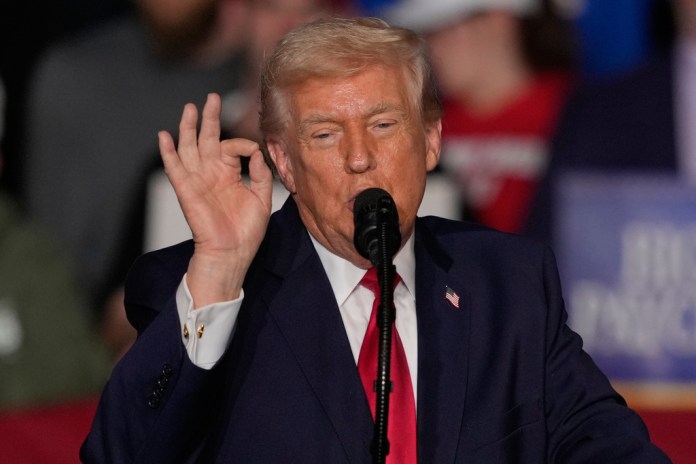Trump’s deportations hit with judicial overreach, experts say
legal experts and allies of President Donald trump have criticized a federal judge for halting the deportation of eight criminally convicted illegal migrants too South Sudan. U.S. District Judge Brian Murphy accused the Trump administration of creating chaos in their immigration enforcement efforts. He stated that the government failed to provide proper legal notice before moving to deport the men, who have no ties to South Sudan, a country experiencing civil war.
In his ruling, Judge Murphy emphasized that due process must be upheld, regardless of the migrants’ criminal histories. The administration argued that the deportations to third countries are necesary for enforcing immigration laws, citing legal authority under the Immigration and Nationality Act. Critics of the judge’s decision have claimed he is overstepping his jurisdiction and creating new rights for deportable individuals, which they argue is outside of judicial purview.
The situation highlights ongoing tensions between executive immigration policy and judicial oversight, marking a legal clash over the administration’s strategy to expedite deportations by sending migrants to countries were they lack connections. Murphy’s ruling has led to increased scrutiny of the administration’s tactics, raising questions about the balance of power in immigration enforcement and the protections afforded to migrants during deportation proceedings.
Trump’s third-country deportations facing judicial overreach, experts say
Legal experts and allies of President Donald Trump are accusing a federal judge of overstepping his authority by halting the deportation of eight criminally convicted illegal migrants to war-torn South Sudan, a flashpoint in the administration’s efforts to expedite U.S. immigration enforcement through third-country removals.
In a scathing ruling on Monday, U.S. District Judge Brian Murphy, an appointee of former President Joe Biden, accused the administration of “manufacturing the very chaos they decry.” Murphy said the government had failed to provide proper legal notice before attempting to remove the men to South Sudan, a nation where they have no ties and where civil war looms, and he required the eight migrants to remain on U.S. territory in Djibouti or be sent back to the U.S. mainland.
“Since that hearing, merely five days ago, Defendants have changed their tune,” Murphy wrote. “It turns out that having immigration proceedings on another continent is harder and more logistically cumbersome than Defendants anticipated.”
Third-country removals, or sending criminal aliens to a country other than the one from which they originated, have become a cornerstone strategy for Trump as he encounters more pushback than past administrations for deporting noncitizens. Some legal hurdles include immigration judges imposing limited removal orders, such as the case of Salvadoran national Kilmar Abrego Garcia, and countries that refuse to take back their citizens living in the United States illegally.
The eight men, all convicted of violent crimes, are now being held at a U.S. military base in Djibouti, which Trump administration officials contend is causing severe logistical and safety risks due to the criminal background of these deportees. And while the judge initially allowed proceedings to continue from abroad, Murphy now appears to be losing patience with the administration’s handling of the case.
“To be clear, the Court recognizes that the class members at issue here have criminal histories,” Murphy added. “But that does not change due process.”
Critics: Judge is inventing rights, ignoring law
Murphy’s decision has drawn intense criticism from some legal experts who argue the judge is unlawfully inventing new rights for deportable illegal immigrants and interfering in immigration authority that Congress has reserved for the Executive Branch.
“Section 241 of the Immigration and Nationality Act specifically permits the Department of Homeland Security to remove an alien to a third country if their home country or last residence won’t take them,” said Art Arthur, a former immigration judge and fellow at the Center for Immigration Studies. “It’s specifically permitted in the INA, and the INA has no restrictions whatsoever.”
Arthur told the Washington Examiner that the judge lacks jurisdiction to halt such removals. “The INA is clear that district courts lack authority to hear habeas efforts to execute removal,” he said. “Congress specifically took away this authority in the Illegal Immigration Reform and Immigrant Responsibility Act, and then again in the REAL ID Act.”
Some of Trump’s allies in Congress have echoed the same sentiments. Rep. Mark Green (R-TN), House Homeland Security Committee chairman, shared concerns about judges’ authority in immigration matters in a Fox News interview.
“We can’t have judges deciding the foreign policy of the country. That is not in their purview. It’s not in the Constitution,” Green said. “These radical judges that have been placed by the Left are attempting to run the country from their bench. And that can’t happen.”
Attorney Bill Shipley, a former federal prosecutor who has represented multiple Jan. 6 defendants, posted to X last week that Murphy’s conduct verges on defying the law.
“Judge Brian Murphy is coming as close as I can imagine to a judge actually violating the law in his official capacity,” Shipley said. “He has declared himself to have jurisdiction where a statute passed by Congress EXPRESSLY tells him he does not.”
Third-country deportations provoke legal clash
The South Sudan case isn’t an outlier; it’s emblematic of the Trump administration’s broader strategy to support immigration enforcement by removing certain migrants to third countries where they have no familial or cultural connections.
In March, over 100 Venezuelan nationals were deported to a maximum-security prison in El Salvador, many labeled as gang members by the Trump administration. Similarly, migrants from Laos, Vietnam, and the Philippines were slated for removal to Libya until Murphy also halted those plans.
Legal scholars critical of Trump’s approach label the approach “punishment as deterrence” or “court baiting,” highlighting the administration’s aggressive tactics to provoke legal challenges and reshape immigration jurisprudence, according to the New York Times.
This approach starkly contrasts with the Obama administration’s deportation policies. While Former President Barack Obama oversaw a record number of deportations, over 3 million during his tenure, including 438,421 in 2013 alone, his administration primarily focused on returning migrants to their countries of origin.
Moreover, the American Civil Liberties Union’s engagement differed between the two administrations. Under Obama, the ACLU filed lawsuits challenging specific practices, such as the detention of asylum-seeking families. However, the organization has taken a more confrontational stance against Trump’s policies, challenging the legality of third-country deportations and the use of the Alien Enemies Act.
The Trump administration has defended its strategy as lawful and necessary. In a March 25 court filing opposing a temporary restraining order related to deportations to South Sudan, Justice Department attorneys argued that the INA grants DHS the authority to remove individuals to various alternate or third countries, including those willing to accept the aliens.
They further argued that the district court lacks jurisdiction under specific provisions limiting judicial review over Immigration and Customs Enforcement’s execution of removal orders. The administration asserted that the migrants have no statutory right to advance notice or special procedures before being removed to a third country, viewing such requirements as extra-statutory and unfounded.
In essence, officials argue they are executing lawful removal orders and that courts should not interfere. This legal posture underscores the administration’s commitment to its immigration enforcement objectives, despite mounting legal challenges and international scrutiny.
Another test case for presidential power
In a so-called remedy order issued Monday, Murphy required that each of the six migrants already flown to Djibouti be granted a “reasonable fear” interview in private, with the option to have legal counsel present, in-person or remotely, at the detainee’s discretion. These interviews, Murphy said, could occur in the U.S. if the government agrees to return them, or abroad so long as DHS maintains “custody and control” under conditions comparable to domestic detention standards.
And in his order on the same day providing “clarification” about the preliminary injunction, Murphy wrote that “no reasonable interpretation of the court’s Preliminary Injunction could endorse yesterday’s events,” referring to the government’s continued attempts to proceed with third-country removals.
He then laid down a firmer procedural marker: any migrant the administration seeks to deport to a third country must now be given at least 10 days to raise a fear-based claim for protection under the Convention Against Torture — a right, he emphasized, that must be meaningfully communicated and observed.
With those orders, Murphy has not only imposed new due process requirements on the Trump administration’s deportation strategy, he’s potentially established a new floor for legal protections in third-country removal cases moving forward, one that will certainly beckon Supreme Court review.
Just hours after Murphy issued that order, the Justice Department filed an emergency application Tuesday with the Supreme Court seeking to lift the judge’s injunction. In the filing, Solicitor General D. John Sauer warned that the decision has created “an intolerable choice” between holding dangerous criminals at a military base overseas or bringing them back to the U.S.
WHITE HOUSE BLASTS ‘RADICAL’ JUDGE WHO STOPPED MIGRANT DEPORTATIONS TO SOUTH SUDAN
“Having slammed on the brakes while these aliens were literally mid-flight—thus forcing the government to detain them at a military base in Djibouti not designed or equipped to hold such criminals—the court then retroactively ‘clarified’ its injunction,” Sauer wrote.
He added that Murphy’s requirements have created “a diplomatic and logistical morass” so severe that both the Secretaries of State and Defense submitted declarations warning of potential harm to U.S. foreign relations.
" Conservative News Daily does not always share or support the views and opinions expressed here; they are just those of the writer."


